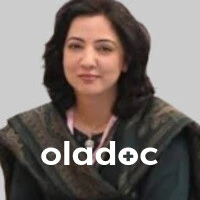7 Best Dermatologists/Skin Specialists in PWD, Islamabad
Also known as Skin Specialist ,ماہرامراض جلد ,Skin Doctor and Mahir-e-imraz-e-jild

Dr. Saira Jabeen
PMDC VerifiedDermatologist, Cosmetologist
MBBS, FCPS (Dermatology), D-DERM Ireland
Dr. Saira Jabeen

PMDC Verified
Dermatologist, Cosmetologist
MBBS, FCPS (Dermatology), D-DERM Ireland
Best Dermatologist in PWD, Islamabad
With oladoc, you can consult the best dermatologists in PWD, Islamabad by booking in-person appointments or online video consultations. You can select a top dermatologist near you from our list at the top of the page while checking patient reviews, doctor qualifications, and ratings.
Who are the best dermatologists in PWD, Islamabad?
The best dermatologists in PWD, Islamabad are:
- Dr. Sheikh Mustanser Siab who practices at SkinDot Clinics (PWD Islamabad) and SkinDot Clinics
- Dr. Fauzia Arshad who practices at SkinDot Clinics (PWD Islamabad)Riphah International Hospital and Riphah Anchorage Medical Center
- Dr. Beenish Maryam who practices at Chinar International Hospital
- Maj. (R) Dr. Ali Riaz who practices at Chinar International Hospital and Life Care Hospital (RWP)
- Dr. Khursheed Azami who practices at Chinar International Hospital
How can I find and book an appointment with a dermatologist in PWD, Islamabad?
You can easily find and book an appointment with a dermatologist in PWD, Islamabad using oladoc.com. To do that, view the list of doctors at the top. You can use filters like "Most Experienced," "Highest Rated," and "Female Doctors" to narrow down your choice.
Once you have chosen your preferred dermatologist from the list, click the "Book Appointment" button to confirm your appointment or you can call oladoc to reach any of the dermatologists practicing at PWD, Islamabad via 0518151800.
Why choose oladoc to book your appointments with the best dermatologist in PWD, Islamabad?
You can book appointments or online video consultations with the best dermatologist in PWD, Islamabad, instantly, through oladoc.com.
When booking your appointments through oladoc.com you can avail discounts on in-person appointments and online video consultations as well.
oladoc features 7 trusted dermatologists in PWD, Islamabad, recognized for their extensive experience, strong qualifications, and wide range of dermatology services.
To book your appointments with a skin specialist in PWD, Islamabad click the book appointment button, download the oladoc app or call 0518151800 to confirm your booking.
Reviewed by: Dr. Nosheeba Salman
Authored by: Dr. Hira Tanveer
Frequently Asked Questions
Who is the best Dermatologist in PWD Islamabad?
5 best Dermatologists in PWD Islamabad are:
- Dr. Sheikh Mustanser Siab
- Dr. Fauzia Arshad
- Dr. Beenish Maryam
- Maj. (R) Dr. Ali Riaz
- Dr. Khursheed Azami
Who are the most experienced Dermatologist in PWD Islamabad?
2 most experienced Dermatologists in PWD Islamabad are:
- Dr. Fauzia Arshad
- Dr. Sheikh Mustanser Siab
How can I book an appointment with a Dermatologist in PWD Islamabad?
What is the fee range of the best Dermatologists in PWD Islamabad?
Are there any additional charges to book an appointment with a Dermatologist in PWD Islamabad through oladoc?
What does a Dermatologist do?
A dermatologist or skin specialist is not only capable of treating a vast number of skin-related illnesses but can also offer beauty advice and help patients achieve skin goals via medical and lifestyle advice.
This means that you don’t have to be sick to meet the best dermatologist in PWD, Islamabad and that they can help you make your skin look even healthier. The range of treatments and advice a skin specialist can give has been growing every year for decades now as our understanding of medicine grows and new technologies become widely available.
The best dermatologists in PWD, Islamabad usually treat skin conditions but are also adept at treating a range of conditions pertaining to nails and hair as well.
You can book an appointment with the best dermatologists in PWD, Islamabad through oladoc.com
How do I choose a Dermatologist?
Finding a good doctor is vital for proper diagnosis & treatment of your underlying concern. Before you make the decision of picking out a Dermatologist, consider the following:
- Make sure they are experienced
- Make sure your doctor has good reviews.
- Make sure they offer the services you are looking for
- Verify, if they are certified from PMDC or have any other professional memberships
- Check if they are affiliated with a hospital you trust
Who are the best Dermatologist near me in PWD Islamabad?
Which Dermatologists in PWD Islamabad charge the lowest fee?
3 Dermatologists in PWD Islamabad which charge the lowest fee are:
- Dr. Fauzia Arshad
- Dr. Beenish Maryam
- Dr. Sheikh Mustanser Siab
Who are the best female Dermatologists in PWD Islamabad?
2 best female Dermatologists in PWD Islamabad are:
- Dr. Fauzia Arshad
- Dr. Beenish Maryam








